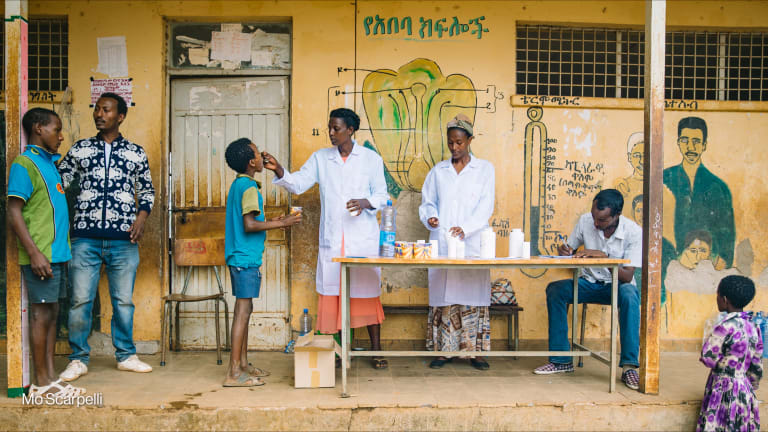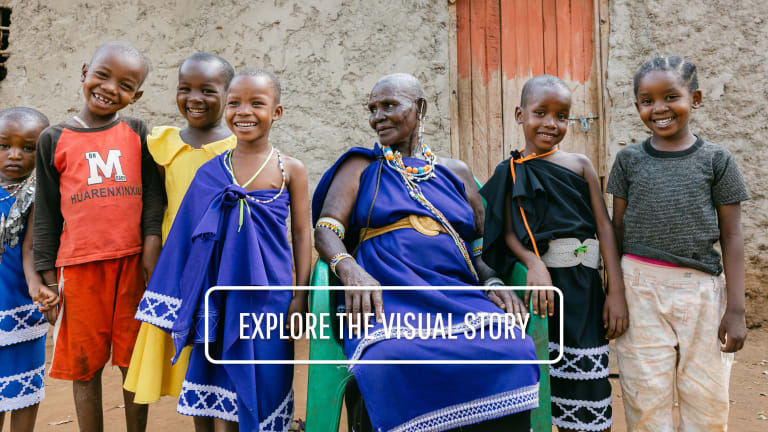Why drug donation programs are a lifeline for NTD elimination efforts

For those working to eliminate neglected tropical diseases, or NTDs, the U.S. foreign aid freeze that began in January 2025 would usher in a new set of challenges. But the month also marked a major milestone in the long fight against NTDs — one that could illustrate a path to maintaining progress amid mounting challenges in the global health sector.
On Jan. 30, the global health care provider MSD* celebrated 5 billion treatments as part of its Mectizan® Donation Program — the world’s longest-running drug donation program for NTDs, which works with partners to distribute Mectizan® (ivermectin) to countries where onchocerciasis, or river blindness, and lymphatic filariasis are endemic. The 38-year-old initiative has made it possible for 47 million people across 13 countries to live without the need for treatment for river blindness — a parasitic disease causing disfiguring skin conditions and visual impairment — according to Allison Goldberg, president of the MSD Foundation and executive director of Global Impact Investing and Giving.
The program has also helped to eliminate river blindness in four countries — Colombia, Ecuador, Guatemala, and Mexico — and lymphatic filariasis in four others — Malawi, Timor-Leste, Togo, and Yemen.
“We’ve donated 5 billion treatments and counting because we know the need and demand is still there — and that is being distributed across 62 countries,” Goldberg said. “So the scale is big, but the success is tremendous.”
With post-pandemic funding declines exacerbated by U.S. aid cuts, though, continued success of such NTD initiatives may be more critical than ever.
“I'm confident that elimination is within reach,” said Vanina Laurent-Ledru, director general of Foundation S – The Sanofi Collective, which is working to eliminate human African trypanosomiasis, or sleeping sickness — a parasitic disease caused by the tsetse fly. “But at the same time, we need to stay in combative mode. We need to sustain the momentum.”
A track record of long-term impact
When it launched in 1987, MSD’s drug donation program was the first of its kind. Its success “helped to spur major industry action toward broader corporate donation programs and a coordinated global response to NTDs,” Goldberg said.
Over the past 30 years, pharmaceutical companies have set up programs to donate 17 different medicines, yielding billions of tablets and other treatments. Today, 12 manufacturers donate 18 medicines directly to the World Health Organization, covering 10 NTDs.
These donations have been credited with playing an important role in fueling progress toward WHO’s NTD road map goals for 2030, particularly the target of reducing the number of people requiring an intervention against an NTD by 90% in line with Sustainable Development Goal 3.3.5.
According to WHO, 56 countries have eliminated at least one NTD as of May 2025, and drug donation programs are helping drive progress toward eradicating more. Sleeping sickness, a potentially fatal disease when not treated early, has seen a 97% reduction in cases since 2001, with Guinea the latest country to eliminate the disease.
This progress has been driven by collaborations between organizations such as Sanofi, which facilitates medicine donations as part of its work with partners, including the Gates Foundation and the Drugs for Neglected Diseases Initiative, or DNDi.
It was also through Sanofi’s partnership with DNDi that the game-changing Fexinidazole, the world’s first all-oral treatment drug for sleeping sickness that replaced toxic medicines, was developed.
“[It’s the] first time in humanity that you can eliminate a disease without a vaccine, and first time in humanity that we can truly, collectively call it a success,” Laurent-Ledru said.
Navigating a resource-scarce landscape
Just as more NTDs are nearing the point of elimination, the significant gains that pharmaceutical-led donation programs have helped acquire may be at risk.
U.S. foreign aid cuts enforced by the Trump administration include $114.5 million that was previously appropriated by the U.S. Congress for the NTD Program’s 2025 budget. According to WHO, this loss has delayed 47 NTD-related campaigns aimed at freeing 143 million people from the burden of these diseases.
Should pharmaceutical donations decline as funder donation gaps also widen, more countries may be left without the medicines they need for both prevention and treatment of NTDs.
In May, Novartis announced that it would continue making medicines for malaria and leprosy regardless of how new orders might be affected by the funding cuts. While Novartis donates a smaller portion of these drugs compared to what it sells, it also pledged $490 million for malaria and NTD research and development, or R&D.
This was welcome news for those close to the NTD cause, but donation program proponents believe more needs to be done to encourage further pharmaceutical drug contributions, especially in the current funding climate.
According to Laurent-Ledru, priority review vouchers are an effective mechanism used by the U.S. Food and Drug Administration, or FDA, to incentivize pharmaceutical companies to develop NTDs in exchange for accelerating the review process for their other drug applications.
“It is critical for the pharmaceutical industry to be incentivized to continue innovating for neglected tropical diseases — or, for that matter, any disease where you know there's not going to be a market,” Laurent-Ledru said.
Claus Runge, chief health equity officer at Bayer Pharmaceuticals, also said priority review vouchers are key, but that more needs to be done to “make sure that there is a constant demand and a constant flow of funds to finance [the development and delivery of] these products.”
Once these products are developed and donated, the savings generated have been proven to substantially offset the costs to national health programs and generate collaborative contributions from bilateral development agencies.
Modeling a pathway forward through partnerships
While the role of government funding cannot be discounted, moving further away from a model heavily dependent on such aid to one that prioritizes public-private partnerships focused on strengthening country ownership could build resilience to geopolitical funding trends.
To end neglected tropical diseases, partnerships are the only way forward,” said Laurent-Ledru. “Actually, it is only thanks to public, private, and now philanthropic partnerships that we've been able to make progress on neglected tropical diseases.”
The strongest argument behind the power of partnerships may lie in the fact that drug donations are just part of the equation.
“To combat neglected tropical diseases, you need agency, action, and investment — agency, in the sense that it is a team sport to develop innovation,” Laurent-Ledru said. Having various partners that can collectively contribute to R&D, distribution, and effective treatment is necessary to “ensure that you can manufacture, deliver, and have sustainable programs for communities,” she added.
For their part, pharmaceutical companies also have the capacity to contribute more than just medicine. For example, while Bayer donates medicine, including two drugs that are effective against sleeping sickness, it also works with its partners to localize production and aid in the last-mile delivery of lifesaving medications.
“Capacity building is key, and that's where we can assist,” said Runge. “We are also elaborating opportunities to localize production of our NTD portfolio, to really help countries in need to have the autonomy to respond. I think that’s key going forward to make countries more resilient in the fight against NTDs.”
Backed by decades of results, proponents of the drug donation model are optimistic that progress will continue toward eradicating further NTDs — as long as pharmaceutical companies stay in the fight.
“Elimination is possible,” Goldberg said. “The data is telling us that it is. And as long as we stick together and we're persistent, we'll continue to achieve our shared objective.”
*Merck & Co., Inc., Rahway, New Jersey, USA, is known as MSD outside the United States and Canada.
Visit Escape the Neglect — a series exploring the extraordinary progress that countries are making in eliminating neglected tropical diseases, or NTDs, and showcasing promising opportunities to build on recent wins.
This content is produced in partnership for our Escape the Neglect series. Click here to learn more.

Search for articles
Most Read
- 1
- 2
- 3
- 4
- 5








